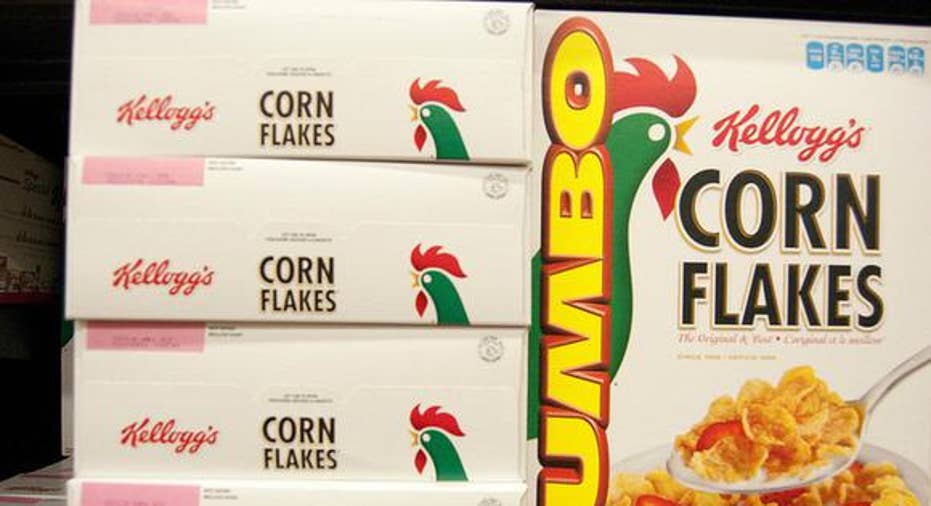Anti-GMO-Labeling Wall Crumbles as Major Food Companies Agree to Label

Corn is one of the most genetically modified crops in the U.S., and Kellogg has agreed to make it known which of its cereals contain GMOs.
The wall of opposition to labeling foods that contain genetically modified organisms is crumbling. After Campbell Soup created the first crack in January by agreeing toslap labels on its soup cans saying they contain GMOs, it was only a matter of time before more fissures would appear.
And now the trickle is threatening to become a torrent, as in quick succession, cereal giantsGeneral Mills andKellogg,candy maker Mars, and diversified food manufacturer ConAgra have all said they would label their packaging, too.
And just like that, what had been an immovable force against GMO labeling, with the companies spending millions of dollars to lobby politicians to thwart labeling efforts at the state and national level, is becoming a deluge washing away the coalition the Grocery Manufacturers Association had arrayed against it.
The lesser of two evilsWhy the sudden change of heart? Simply, a bill in the U.S. Senate that would have blocked state laws such as Vermont's mandatory GMO labeling law from going into effect while creating a national, voluntary system stalled.The prospect of a patchwork quilt of 50 state laws all mandating different things meant food manufacturers needed to get out in front of the issue and begin labeling their products as a means of thwarting more states from passing laws.
Vermont was the first state to pass a meaningful GMO labeling requirement, and it's scheduled to go into effect in July. While Connecticut and Maine have also passed laws, they don't kick in until a number of other states also pass such laws. Since the food manufacturers couldn't stop Vermont's law from taking effect, they need to prevent others from jumping aboard and proposing their own requirements.
And the food makers are right. Complying with 50 different laws would make the cost of compliance astronomical, but they really have no one to blame except themselves. By largely opposing any national standard they created the situation they now face.
Standing by its decisionYet as Campbell Soup made clear when it announced it would no longer oppose GMO labeling initiatives, it still unreservedly supports genetic modification. It believes the practice of labs altering food is completely safe for human consumption and it says GMOscan go a long way toward helping feed the world's starving people.
Most other big food companies feel similarly. In General Mills' statement lamenting the failure of a national policy, it said "20 years of research, and every major health and safety agency in the world agree that GMOs are not a health or safety concern." Indeed, that's why Monsanto has long opposed any labeling requirement, arguing since there's no health issue, it shouldn't be mandated, and if people want to avoid GMOs they can just buy certified organic goods.
Soybeans are the No. 1 genetically modified crop, with an estimated 94% of the supply being lab-altered. That means any product on a store shelf containing soy is likely GM, too. Photo source: United Soybean Board.
Panic or profitOf course, the real reason companies oppose labeling is they're afraid of the public's reaction once they realize just how pervasive genetically altered foods are. Soybeans are the most widely engineered crop in the U.S., with 94% of the supply coming from GMOs. Corn is tied for second with cottonseed as the next-most-modified crop with 89% of the supply lab-altered. Canola, papaya, sugar beets, and even zucchini are also broadly GMO, and any product that contains them -- soy and corn seem to be found in almost everything -- means they too contain genetically modified organisms. It's estimated that some 60% to 70% of all food products on supermarket store shelves have GMOs in their DNA.
Monsanto is practically synonymous with GMOs, as its seeds have been modified to withstand the application of its Roundup herbicide and still grow. But as superweeds have developed from the overapplication of such herbicides (and superbugs are now forming, too, because of the overuse of pesticides on GM crops), other companies such as Dow Chemical are upping the arms race by introducing new, more potent chemicals to offset the immunity they've created.
And there is the potential all this could be washed away if there is a severe consumer backlash as a result of finding out just how much of the food we're eating is genetically altered. Food manufacturers such as General Mills, Kellogg, and ConAgra could demand non-GMO ingredients for their products, forcing farmers to switch to non-GMO seed.
But what they're really counting on is consumer apathy. After seeing just how much GM food they've already eaten without adverse effects, consumers are just as likely to shrug their shoulders and carry on.
The article Anti-GMO-Labeling Wall Crumbles as Major Food Companies Agree to Label originally appeared on Fool.com.
Rich Duprey has no position in any stocks mentioned. The Motley Fool has no position in any of the stocks mentioned. Try any of our Foolish newsletter services free for 30 days. We Fools may not all hold the same opinions, but we all believe that considering a diverse range of insights makes us better investors. The Motley Fool has a disclosure policy.
Copyright 1995 - 2016 The Motley Fool, LLC. All rights reserved. The Motley Fool has a disclosure policy.



















